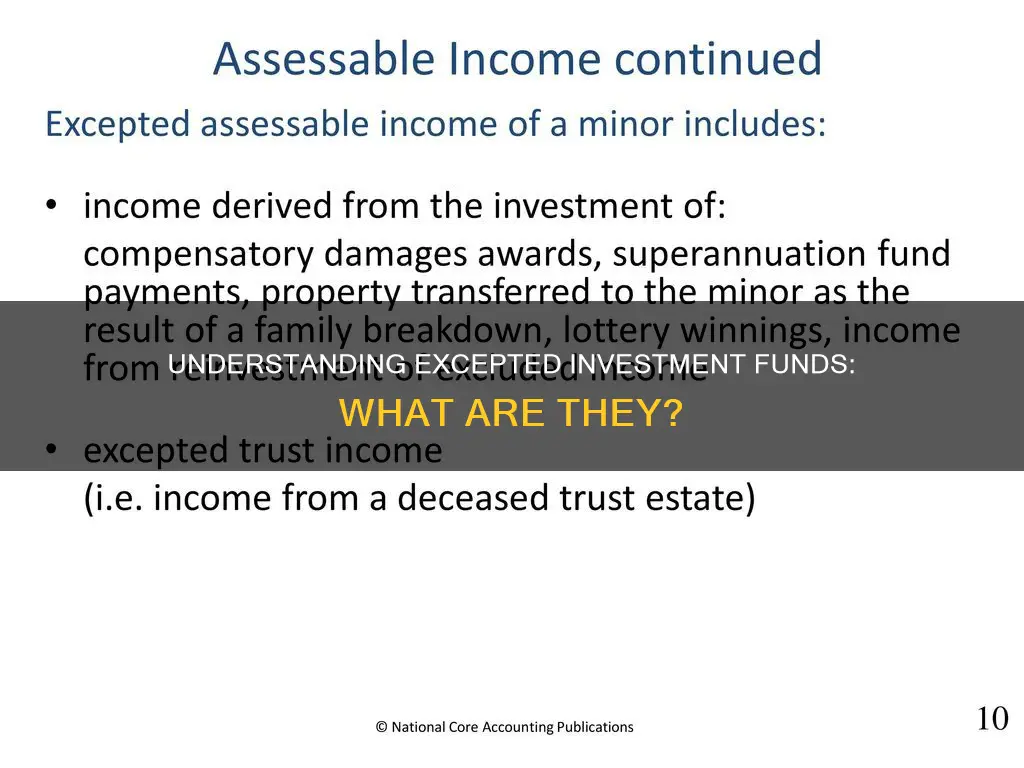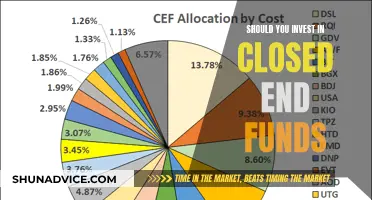
An excepted investment fund is a type of investment fund that is exempt from certain reporting requirements for financial disclosure. Excepted investment funds are typically widely held investment funds, such as mutual funds, regulated investment companies, common trust funds, pension funds, or other pooled investment vehicles. To be considered an excepted investment fund, the fund must be either publicly traded or available, or have widely diversified assets. Additionally, the investor must not exercise control or have the ability to exercise control over the financial interests held by the fund. The specific definition and requirements for excepted investment funds may vary depending on the jurisdiction and applicable regulations.
Characteristics of an Excepted Investment Fund
| Characteristics | Values |
|---|---|
| Type of Fund | Widely held investment fund, including mutual funds, regulated investment companies, common trust funds, pension funds, or any other pooled investment fund |
| Availability | Publicly traded or available on the market |
| Diversification | Widely diversified, without a stated policy of concentrating investments in any specific industry, business, or country (except the US or a single state within) |
| Control | The investor neither exercises control over nor has the ability to exercise control over the financial interests held by the fund |
| Holdings and Income | No information is required about the underlying holdings or income, but the fund must be identified as an interest in property and/or a source of income |
| Reporting Requirements | Filers must disclose the category of value of the fund interest held, aggregate income received from the fund, and value of transactions involving shares or units of the fund |
What You'll Learn

Excepted investment funds are widely held investment funds
Excepted investment funds are a type of widely held investment fund. They are defined as such when they meet certain criteria. Firstly, they can be a mutual fund, a regulated investment company, a common trust fund maintained by a bank or similar financial institution, a pension or deferred compensation plan, or any other type of pooled investment fund. Secondly, they are either publicly traded or available, or they have widely diversified assets. Finally, the investor or filer does not exercise control over the financial interests held by the fund and has no ability to do so.
A fund is considered widely diversified if it does not concentrate its investments in any particular industry, business, or country other than the United States or the bonds of a single state within the US. This means that no more than 5% of the value of its portfolio is held in the securities of any one issuer (aside from the US government).
In the context of financial disclosure reports, excepted investment funds are treated differently from other types of investments. While filers must disclose certain information about the fund, such as its value and income received, they are not required to provide details on the underlying holdings or income from those holdings. This is because the investor or filer has no specific knowledge of the holdings or sources of income of the fund.
It is important to note that the classification of an investment fund as "excepted" does not determine whether it is exempt from the criminal conflict of interest statute. Some excepted investment funds may require additional scrutiny by ethics officials to identify potential conflicts of interest.
Active vs. Passive Funds: Which Investment Strategy is Right?
You may want to see also

They are publicly traded or available
An excepted investment fund is a type of investment fund that is defined by specific criteria. One of the key characteristics of an excepted investment fund is that it is publicly traded or available. This means that the fund is accessible to the public and can be traded on a public exchange or market. Being publicly traded or available is one of the conditions that qualify an investment fund as "excepted".
When an investment fund is publicly traded, it means that it is listed and traded on a recognised stock exchange or market, making it easily accessible to investors. This also provides transparency in pricing and liquidity, as the buying and selling of the fund's shares or units occur in a public and regulated environment. The availability of the fund to a wide range of investors is an important aspect of being "excepted".
The public nature of these funds also means that information about their performance, holdings, and financial interests is generally available and more transparent. This transparency can help investors make informed decisions and understand the nature and composition of the fund. It also allows for a level of scrutiny and oversight, as the fund's activities are not restricted to a private or limited group of individuals.
Being publicly traded or available is not the sole criterion for an excepted investment fund. These funds are also characterised by being widely held or widely diversified. A widely held fund typically refers to a fund where no single investor or entity holds a dominant or controlling stake, ensuring that no one party can exert significant influence over the fund's financial interests.
Additionally, an excepted investment fund is defined by the level of control that investors have over the fund's financial interests. To qualify as excepted, investors should neither exercise control nor have the ability to exercise control over the financial interests held by the fund. This means that the fund's investment decisions and strategies are independent of the influence of any single investor, further emphasising the fund's diversification and autonomy.
Mutual Funds: Investing in India from the USA
You may want to see also

They are widely diversified
An excepted investment fund is a widely held investment fund that is publicly traded or available. These funds are typically diversified across a range of industries, businesses, and countries, rather than concentrating investments in a specific area. This means that they offer investors a variety of investment options and reduce the risk of investing in a single industry or market.
The diversification of excepted investment funds can be significant, as they are not limited to investing in a single industry or country. This means that they can provide investors with exposure to a broad range of assets, sectors, and markets, which can help to spread risk and potentially increase returns.
One of the key features of an excepted investment fund is that the investor does not exercise control over the financial interests held by the fund. This means that the fund is managed by a professional investment manager or institution, which makes decisions on behalf of the investors based on the fund's investment objectives and guidelines.
Excepted investment funds can include mutual funds, regulated investment companies, common trust funds maintained by banks or similar financial institutions, pension or deferred compensation plans, and other types of pooled investment funds. These funds are typically available to a wide range of investors and can provide a convenient and diversified investment option for those who may not have the time or expertise to manage their own investment portfolios.
The diversification of excepted investment funds can be an attractive feature for investors who are looking for a convenient and relatively hands-off approach to investing. By investing in a diversified fund, investors can access a professionally managed portfolio that aims to reduce risk and provide long-term returns.
A Guide to Investing in US Index Funds from India
You may want to see also

Investors have no control over the financial interests held by the fund
An "excepted investment fund" is a widely held investment fund, such as a mutual fund, pension fund, or any other pooled investment fund. For investors to have no control over the financial interests held by the fund is one of the key criteria for a fund to be considered an "excepted investment fund". This means that investors cannot influence the financial decisions made by the fund regarding its holdings or sources of income. The investors neither exercise control nor have the ability to exercise control over these financial interests.
This lack of control is an important distinction for "excepted investment funds" as it sets them apart from other types of investment funds where investors may have some level of influence or decision-making power. It is worth noting that this criterion is in addition to the fund being publicly traded, available, or widely diversified. The diversification of the fund is also a critical factor, with a threshold that the fund does not hold more than 5% of its value in the securities of any single issuer (excluding the US government).
The rationale behind this criterion is to ensure that the investors' interests are aligned with the fund's performance as a whole, rather than giving them the ability to make decisions that may benefit their individual interests at the expense of other investors or the fund's overall health. This structure helps maintain the integrity of the fund's investment strategy and reduces the potential for conflicts of interest.
In the context of financial disclosure reports, the lack of control by investors over the financial interests held by the fund is a critical piece of information. It means that investors are not required to disclose detailed information about the underlying holdings or income of the "excepted investment fund". However, they must still provide certain information, such as the identification of the fund as an interest in property or a source of income, the value of the fund interest held, and the aggregate amount of income received from the fund.
Overall, the condition that investors have no control over the financial interests held by the fund is a defining characteristic of an "excepted investment fund". It ensures that investors are treated similarly to other types of investors in terms of their influence on the fund's financial decisions and helps maintain the integrity and transparency of the fund's operations.
Who Should Invest in Mutual Funds?
You may want to see also

They are not exempt from 18 U.S.C. 208(a)
Excepted investment funds are a type of investment vehicle that is exempt from certain regulatory requirements. These funds typically benefit from streamlined reporting and disclosure obligations, making them attractive to fund managers and investors seeking more efficient and cost-effective structures. While these funds enjoy exemptions from specific rules, it is important to remember that they are not exempt from all regulations. In particular, they remain subject to the constraints imposed by 18 U.S.C. § 208(a), which addresses issues relating to conflicts of interest for federal employees.
When it comes to 18 U.S.C. § 208(a), excepted investment funds are not exempt from its provisions. This statute prohibits federal employees from taking part in matters that would significantly impact their financial interests or those of specific individuals or organizations with whom they are associated. The law is designed to prevent conflicts of interest and ensure that federal employees act in the best interests of the public, rather than being unduly influenced by their personal financial situations. By not exempting excepted investment funds from this statute, regulators maintain a consistent standard across the investment industry, promoting transparency and fair dealing.
The application of 18 U.S.C. § 208(a) to excepted investment funds underscores the importance of maintaining ethical standards and avoiding conflicts of interest in the financial sector. Fund managers and employees of these funds must remain vigilant in identifying and disclosing any potential conflicts that may arise. This includes situations where their personal financial interests could be affected by the investment decisions they make or the regulatory actions they take. By adhering to the requirements of 18 U.S.C. § 208(a), excepted investment funds can maintain their integrity and ensure that their activities are beyond reproach.
Additionally, the inclusion of excepted investment funds under 18 U.S.C. § 208(a) reinforces the need for robust compliance programs within these organizations. Fund managers must establish comprehensive policies and procedures to identify, mitigate, and manage conflicts of interest effectively. This includes regular training and education for employees, as well as a culture that encourages the reporting of potential issues without fear of retaliation. By investing in strong compliance infrastructure, excepted investment funds can proactively manage their conflicts of interest and maintain their standing in the eyes of regulators and investors alike.
In summary, while excepted investment funds enjoy certain regulatory exemptions, they are not exempt from the crucial conflict of interest provisions outlined in 18 U.S.C. § 208(a). This statute ensures that federal employees, including those working in excepted investment funds, act with integrity and in the public's best interest. By complying with this statute, excepted investment funds can maintain their reputation, attract investors who value ethical standards, and contribute to a fair and transparent investment landscape. It is important for participants in these funds to understand their obligations under the law and to proactively manage any potential conflicts of interest that may arise.
A Simple Guide to Vanguard S&P 500 Mutual Funds
You may want to see also
Frequently asked questions
An excepted investment fund is a widely held investment fund that is either publicly traded or available, or has widely diversified assets. This includes mutual funds, regulated investment companies, common trust funds maintained by banks or similar financial institutions, pension or deferred compensation plans, or any other pooled investment fund.
An example of an excepted investment fund is a mutual fund, which is a type of investment vehicle that pools money from many investors to purchase a diversified portfolio of assets, such as stocks, bonds, and other securities.
One of the benefits of an excepted investment fund is that it provides diversification, reducing the risk associated with investing in individual stocks or assets. By pooling money from many investors, excepted investment funds can invest in a broader range of assets, spreading out the risk and potentially providing a more stable investment option.







